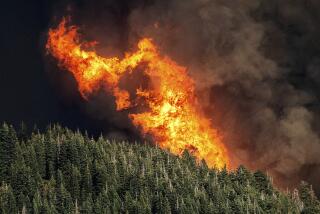Tuvalu Sinks Today--the Rest of Us Tomorrow?
- Share via
To paraphrase Abraham Lincoln, the world will little note nor long remember the inhabitants of the Pacific Island nation of Tuvalu. But these 11,000 people, who live on nine coral atolls a few hundred miles northwest of American Samoa, have earned a distinction, however dubious. They may comprise the first country to pay the ultimate price for a changing climate: national extinction. Rising sea levels are gradually inundating Tuvalu.
Last year, the citizens of Tuvalu started looking for a new home, appealing to New Zealand and Australia to help in the full-scale evacuation of Tuvalu’s population. After an apparent rebuff from Australia, the first group of Tuvalu evacuees is due to leave for New Zealand this year. And on the nearby island nation of Kiribati, a similar future may be in store because rising ocean water is beginning to destroy coastal roads and crops.
The fate of Tuvalu reminds us that the world really is heating up and that global warming is not just an environmentalist scare tactic. The 1990s was the hottest decade on record. Worldwide, glaciers are in retreat and ocean levels are rising. If current trends persist, Montana’s Glacier National Park might well be without glaciers in 30 years. Likewise, Africa’s celebrated snows of Kilimanjaro might soon melt into history.
Despite the efforts by some industry groups to discredit the science behind global warming, the U.S. public doesn’t buy it. Indeed, recent polls show that a majority of Americans are concerned about the impacts of global warming on the health of people and the environment and believe that the U.S. government should take action to prevent it.
There are good reasons why the average American should care about global warming. Our cities will get hotter, and heat stress mortality among the elderly will likely rise. Higher temperatures will lead to higher sea levels, which means that many coastal areas such as New Orleans’ French Quarter and lower Manhattan will be at risk from flooding unless billions are spent on dikes and other measures.
Another likely outcome of a warmer world is the spread of vector- and waterborne diseases such as malaria, yellow fever and dengue.
The American Public Health Assn. already has issued a resolution calling for the government to do something about this.
Other potential effects of global warming include the likelihood of more hurricanes, windstorms and droughts, reduced water availability and water quality, greater air pollution and the demise of large numbers of plant and animal species.
What can we do? For starters, we must stop denying reality. Tuvalu’s inhabitants surely aren’t. The Earth’s temperature is increasing, and we must act to prevent or at least lessen the consequences.
Fortunately, a great many things can be done. Many businesses can and are beginning to take voluntary measures that have the dual benefits of reducing their greenhouse gas emissions while also saving money.
But voluntary actions alone won’t solve the climate change problem. What’s needed is a serious commitment by the U.S. government, which has done virtually nothing, despite the fact that our nation is the world’s largest contributor of greenhouse gases.
Ultimately, we need an economywide climate policy that includes mandatory caps on greenhouse gas emissions. Constructing such a system takes time and requires political will.
Meanwhile, there are immediate steps that can be taken: Specifically, federal policies should be enacted that limit emissions from dirty power plants, increase the fuel efficiency of cars and trucks, provide incentives to businesses to cut emissions and increase the federal investment in developing clean-energy technologies and getting them to market.
It’s too late for Tuvalu, but taking these steps will help the rest of us by curbing rising temperatures, giving us cleaner air and providing more sustainable, dependable and ultimately cheaper ways to meet our energy needs.
Not a bad bargain for the future.
More to Read
Sign up for Essential California
The most important California stories and recommendations in your inbox every morning.
You may occasionally receive promotional content from the Los Angeles Times.













